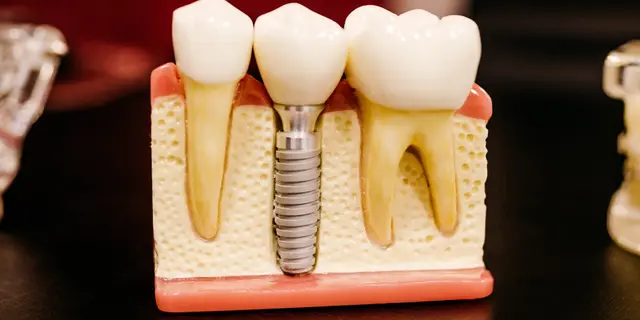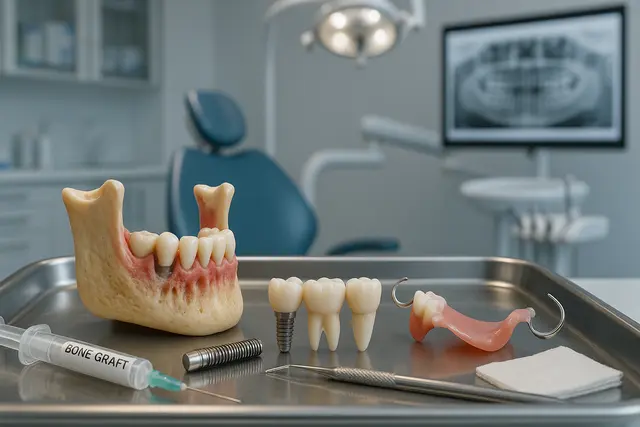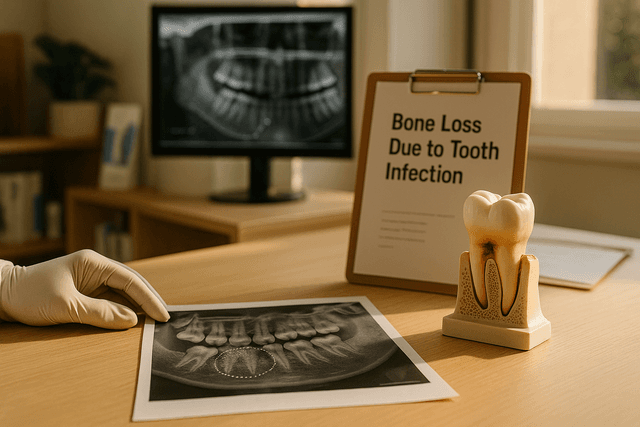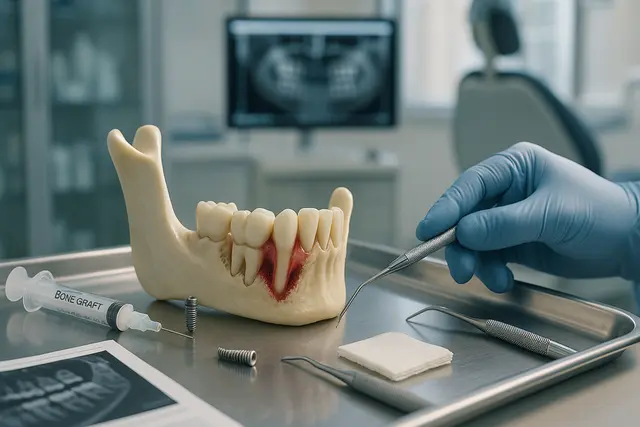Oral Health
5 min read
Nov 27, 2024
Understanding the Link between Oral Health and Overall Wellbeing
A bright, healthy smile is often considered a symbol of vitality and happiness. However, the significance of oral health goes beyond just appearances.

You know that clean-mouth glow you feel after a good brushing? It’s more than a confidence boost. Your oral health is working behind the scenes, guarding the rest of your body in ways most of us never consider. Skip the floss, let plaque lounge on your teeth and gums, and suddenly you’ve given unfriendly oral bacteria a free ticket to every corner of the body. What starts as a tooth decay can snowball into problems that touch your heart chambers, lungs, and even your mood.
Oral Health: A Tiny Ecosystem with Big Swagger
Roughly seven hundred species of microbes set up shop in the mouth. Most are harmless, many are helpful, but a few troublemakers thrive when poor oral hygiene creeps in. Those renegades fuel tooth decay and gum disease and kick-start inflammatory signals that travel well beyond the jaw. Researchers keep finding that oral health affects overall health, turning the mouth into a miniature forecast for everything from cardiovascular disease to respiratory diseases.
Overall Health: When the Mouth Chats with the Body
Here’s the big picture. Bacteria in your mouth hitch a ride through the bloodstream, sometimes collecting on the lining of the heart. That can trigger endocarditis, a rare yet frightening infection noted by the Mayo Clinic. Chronic inflammation from periodontal disease also raises the odds of clogged arteries and heart disease. A severe form of gum disease, periodontitis, has been tied to stroke, and one study found that stroke might be linked to the inflammation sparked by lingering oral infections.
Dental: Your Front-Line Allies
Every six months (or sooner), a dentist peers inside, looking for tiny clues that predict bigger storms. The American Dental Association reminds us that the condition of their mouth often mirrors general health. Untreated dental caries might hint at unmanaged diabetes. A suspicious spot could be early oral cancer. The relationship between oral health and systemic disease is a two-way street, and dental professionals know the traffic patterns.
Oral Hygiene: Small Habits, Huge Payoff
Good oral hygiene is simple, twice-daily brushing, daily flossing, and cleanings booked on time, yet its impact is massive. Regular dental care scrapes away plaque before it hardens, stopping tooth decay and gum disease at the gate. Skipping that routine invites risk factor after risk factor. Poor oral hygiene is linked to premature birth, respiratory infections, and missed days at work when emergencies strike at 3 a.m.
Dental Care: More Than Fancy Tools
Access to dental care still escapes many families. Whether it’s cost, scheduling, or finding a provider who takes your dental insurance, barriers remain. The University of Illinois Chicago dental clinic shows how teaching hospitals and community centers can bridge gaps by offering low-fee dental services. Health policy experts argue we need to integrate oral health into primary health to close these gaps for good.
Connection Between Oral Health and Chronic Disease
Let’s zoom in on inflammation. Periodontal disease bathes blood vessels in inflammatory chemicals that travel to the heart and brain. Cardiovascular disease loves inflammation; it helps fatty deposits stick to arterial walls. The result? A higher chance of cardiovascular events down the road. Researchers also flag periodontitis as a companion problem for diabetics, since chronic gum infections make controlling blood sugar harder.
Good Oral Habits vs. Poor Oral Health
Want a quick checklist for good oral living? Brush with fluoride toothpaste, floss nightly, ditch sugary snacks before bed, and schedule cleanings. Add a soft laugh, because stress hormones can reduce saliva and tip the scales toward dental problems. It’s easier to build good oral routines than to fix poor dental health later.
Oral Health and Mental Well-Being
The mouth-mind link is powerful. Mouth and teeth affects self-esteem in job interviews; chipped incisors or chronic pain can make anyone self-conscious. One study showed teeth affects their ability to eat foods they love, too. That spiral fuels anxiety, proving oral health and mental resilience dance together more than we think.
Dentist Visits: Getting Past the Door
Going to the dentist still tops many “least favorite” lists, yet taking care of your oral health starts there. Cleanings uncover dental disease before it screams. Your provider can flag untreated dental caries, prescribe oral care tailored to dry mouth or acid reflux, and explain why oral health status shifts with certain medications. If you worry about bills, get dental quotes from community clinics first; many offer payment plans.
Relationship Between Oral and General Health
Experts studying oral and systemic health urge physicians and hygienists to collaborate. Integrating oral health screenings into annual physicals helps catch problems early. The goal is simple: make oral health a key part of your overall preventive routine, right alongside blood pressure checks and vaccine updates.
General Health Topics: Policy, Research, and You
Public health professions keep pounding the drum that oral health and systemic well-being must be viewed together. Health topics once siloed, like oral health and chronic heart conditions, are blending. Health policy groups push to widen access, expand primary health training, and funnel research money toward the link between oral health and overall health.
Practical Tips for Everyday Folks
Replace your toothbrush every three months.
Swish with water after coffee, surface stains love espresso.
Snack on crunchy veggies; they scrub plaque and feed the body.
Read ingredient lists; sneaky sugars fuel oral bacteria.
Book regular dental checkups even if nothing hurts. Prevention beats repair.
The Takeaway
Know that your oral health is more than a bright smile. The connection between oral health and the rest of your body is intimate, constant, and sometimes surprising. Tooth decay and gum disease don’t stay parked in the jaw. They roam to the heart, lungs, even joints, nudging systemic health in the wrong direction.
Make oral health part of your overall self-care. A cheap brush, a roll of floss, and a trusted dentist form a small team with colossal impact on overall well-being. When you integrate simple habits into daily life, you protect healthy teeth and gums, lower the chance of systemic disease, and add spark to every laugh that leaves your lips, proof that taking care of your oral health really is taking care of you.
How Does Poor Oral Health Affect the Rest of the Body?
Poor oral health allows harmful bacteria to enter the bloodstream, potentially triggering inflammation in distant organs. This can contribute to serious conditions like heart disease, stroke, respiratory infections, and even complications with diabetes or pregnancy.
Can Gum Disease Increase the Risk of Heart Problems?
Yes, chronic gum inflammation from periodontal disease can raise the risk of heart problems. The bacteria and inflammatory markers involved in gum disease may promote plaque buildup in arteries, increasing the chances of cardiovascular events like heart attacks or strokes.
Why Is Oral Health Linked to Mental and Emotional Well-Being?
Oral health impacts confidence, self-esteem, and even daily functions like eating and speaking. Issues like tooth loss or chronic pain can contribute to anxiety, social withdrawal, and reduced quality of life, showing that oral health and mental health are closely connected.
What Are the Best Habits for Protecting Both Oral and Overall Health?
Brush with fluoride toothpaste twice daily, floss once a day, limit sugary snacks, and see your dentist regularly. Managing stress and staying hydrated also helps, as saliva plays a key role in protecting teeth and gums, and by extension, your whole body.
Read Next
Related Posts

Oral Health
Tooth Replacement Options to Prevent Bone Loss
Losing a tooth isn’t just about appearance, it can have a lasting impact on your oral health, jawbone strength, and overall quality of life. When teeth go missing, the jawbone begins to shrink, which can change your bite, your facial structure, and even your confidence. Fortunately, modern dentistry offers several effective solutions to replace missing teeth and prevent further bone loss.
4 min read
Sep 26, 2025

Oral Health
Bone Loss Due to Tooth Infection Explained: What It Means for Your Oral Health
A tooth infection isn’t just about pain, it can quietly damage the tissues around a tooth and even erode the jawbone that supports your smile. This guide explains how infections start, why they can lead to bone loss, the warning signs to watch for, and the treatments that can stop the spread and rebuild lost support.
5 min read
Sep 25, 2025

Oral Health
Understanding Bone Loss in Teeth: Causes and Treatments That Work
Bone loss in teeth is a silent threat that can compromise your smile, facial structure, and overall oral health. While it often goes unnoticed in the early stages, it can lead to serious consequences if left untreated. Understanding what causes dental bone loss, and how to prevent or manage it, is key to maintaining a strong, healthy foundation for your teeth.
5 min read
Sep 25, 2025
Don’t have time to research every dentist around you?
See why 30k+ patients trusted us